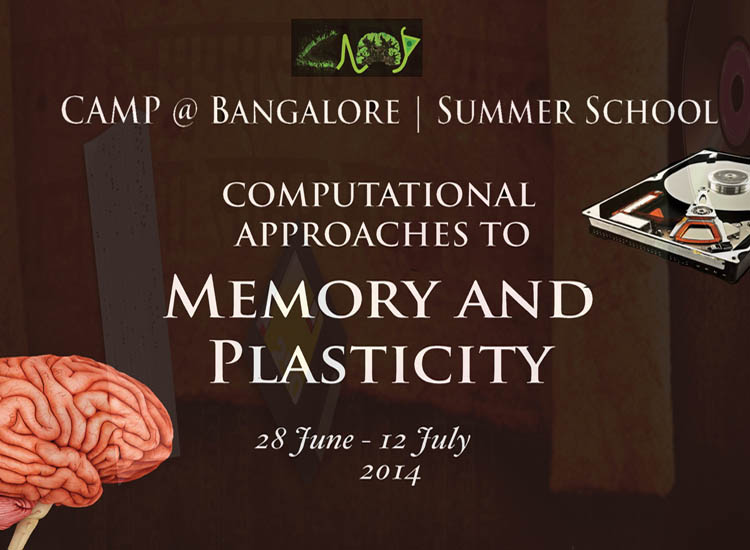CAMP@Bangalore summer course in NCBS
Starting from Saturday 28th June, NCBS will be hosting India's first-of-its-kind intense 15-day summer school "Computational Approaches to Memory and Plasticity (CAMP@Bangalore)" on the theory and simulation of learning, memory and plasticity in the brain.
Conveying the excitement of this course, Suhita Nadkarni, a faculty member at IISER, Pune and an instructor on the course states "This is an exciting time for Neuroscience Research. There is global awareness about the challenges that lie ahead and an impetus to address them, with the European Brain Council declaring 2014 the year of the brain and the US President Obama's BRAIN initiative. A hands-on workshop on computational neuroscience like CAMP@Bangalore can lay the crucial groundwork by attracting the brightest young scientists and giving the right kind of training from some of the best researchers in the field."
CAMP@Bangalore follows-on from the highly successful Summer school on Computational and Cognitive Neuroscience (CCNSS), which has been hosted in China annually since 2010 with active support from the Cold Spring Harbor Laboratories-Asia Branch. This prestigious international course, with outstanding faculty, has had a marked effect on strengthening research and human resource development in China this area. The organisation of a similar course at NCBS is the first attempt to bring this effort to India with the aim of stimulating and strengthening the field in the country. This effort is spear-headed by Upinder Bhalla from NCBS, with his considerable experience of organising the CCNSS in China and is supported by top experts in the area.
Cognitive and computational neuroscience and neuroinformatics are fields with special relevance to India. The establishment of the Indian National Node for Neuroinformatics in 2009 has already provided some momentum to this area of research. Cognitive neuroscience has also been strongly supported by Indian funding agencies, notably the DBT and DST. Bhalla believes that the computational emphasis of the course is very well aligned with the strength of our country in computer sciences. This therefore offers strong prospects of expanding research in an area which needs intellectual stimulation and collaborations.
CAMP@Bangalore is being attended by graduate students and post-doctoral researchers from both theoretical and experimental backgrounds in multidisciplinary fields. 36 trainees have been selected for the full course with almost equal representation from India and overseas, and further 23 students from India have been selected for on-site lectures. The faculty include an array of international leading authorities in the field of cognitive and computational Neuroscience. The course is structured as a combination of lectures, remedials on neuroscience/math/programming, hands-on tutorials, discussions and project work. Much of the organization of the course has been made possible by the support of administrative staff at inStem/NCBS, the Meetings Office and a team of Teaching Assistants (TAs), some of whom such as Aditya Gilra and Eric de Witt have also been similarly involved inrunning the courses in China. Mohan Raghavan, Subhasis Ray and Sahil Moza for whom being a TA is a new experience opine that it will be a great learning experience for them since "You learn best when you are trying to teach".
"There have been major advances in our understanding of the molecules and the physiology of the cells involved in learning and memory. We also have some general idea about the neuronal circuits that are involved for certain tasks. However, it is the link between molecules, cell and circuits that is missing. A theoretical framework and computational tools (central theme of the workshop) would be key to fill this essential gap. By having some of the star scientists in this field talk about their work creates the right kind of excitement that will be contagious", says Nadkarni.
When asked about the importance of this course in the Indian and global context, Prof. Upi Bhalla states "There is a huge latent interest in brain function in India. Many of the very talented young people in India who would like to think about this find themselves channelled into engineering or physical sciences disciplines, from which there is no obvious way to jump disciplines. With the CAMP@Bangalore course we hope to open doors for students to explore such interests. The course is our way to bring together students from many disciplines, and many parts of the world, to look at one of the most fascinating abilities of the brain. These courses are also a proven way to build networks among young scientists that enrich their professional lives with friends and colleagues around the world. Someday, perhaps, some of them will be our young and rising colleagues at NCBS too."
So is it all work and no play? No, the intense programme has its light moments with group sport activities, a chance to design course souvenir T-shirts and a day-trip to a local tourist spot.

Comments
Post new comment